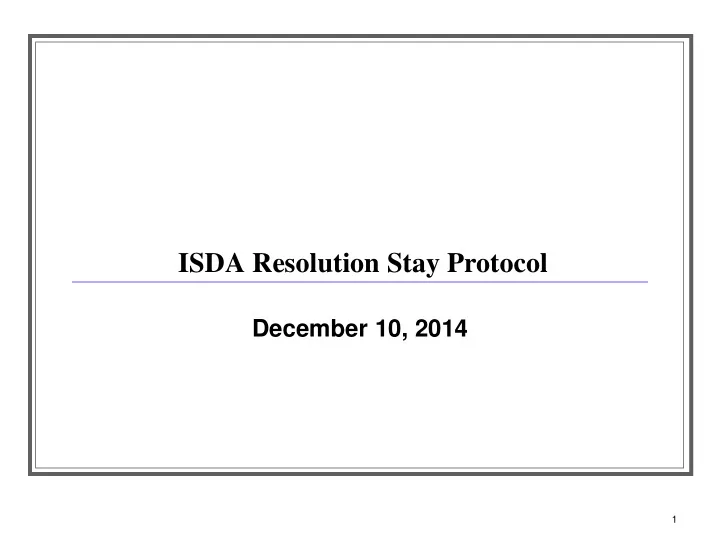

ISDA Resolution Stay Protocol December 10, 2014 1
Background Parties to OTC derivatives may be able to exercise early termination rights and other remedies ( e.g. , set-off against collateral they hold) if their counterparty, or any affiliate, is subject to resolution or insolvency proceedings. If not exercised in an orderly manner, these actions could result in additional defaults ( e.g. , affiliate defaults), unhedged portfolios and/or fire sales of collateral, likely amplifying the systemic knock-on effects of a financial company’s resolution or insolvency proceedings. Title II of the Dodd-Frank Act and the FDI Act both contain a one-business-day stay before a financial company’s counterparties may exercise early termination rights and other remedies under OTC derivatives and other financial contracts. During this stay, the FDIC, as receiver, may transfer the contracts or take certain other actions which, if successful, result in the counterparties’ no longer having the right to terminate or exercise other remedies as a result of the resolution proceedings. The stay may not always be enforceable in a cross-border context. The U.S. Bankruptcy Code does not stay the exercise of early termination rights or other remedies under OTC derivatives and other financial contracts. In early 2013, ISDA formed a working group to consider these issues. On November 5, 2013, the FDIC, the Bank of England, BaFin and FINMA wrote a joint letter to ISDA requesting that standard ISDA documentation provide for a short-term suspension of early termination rights and other remedies on the basis of the commencement of an insolvency or resolution proceeding or exercise of a resolution power with respect to a counterparty or its specified entity, guarantor or credit support provider. The Japan FSA has joined in the recommendation. On November 12, 2014, ISDA published the Resolution Stay Protocol. 2
Section 1 Provides a mechanism for enforcement of the stay provisions under Title II of the Dodd-Frank Act and the Federal Deposit Insurance Act to foreign counterparties of insured depository institutions and financial companies for which the FDIC has been appointed receiver. Provides for cross-border application of temporary stays under special resolution regimes. Adhering parties “opt-in” to the stay provisions in the special resolution regime(s) that may apply to their OTC derivatives counterparties that are also adhering parties. The length of the temporary stay, how and when the temporary stay becomes a permanent stay and the applicable creditor protections are as set forth in the applicable resolution regime. Special resolution regimes initially include Title II of the Dodd-Frank Act and the Federal Deposit Insurance Act in the United States, as well as resolution regimes with temporary stays on close-out rights in the United Kingdom, Germany, Switzerland, Japan and France. Resolution regimes subsequently adopted in other FSB jurisdictions that include certain creditor protection provisions may also qualify as special resolution regimes under Section 1. 3
Section 2 Addresses an identified impediment to orderly resolution in the resolution plans submitted to the FDIC and the Federal Reserve by certain financial companies under Title I of the Dodd-Frank Act. Provides for temporary stays of termination rights for cross-defaults resulting from affiliate insolvency proceedings under a limited number of U.S. resolution regimes, including the U.S. Bankruptcy Code, the Federal Deposit Insurance Act and, in limited circumstances, the Securities Investor Protection Act. Upon commencement of proceedings, adhering parties agree to be stayed for the longer of one business day and 48 hours, provided that certain creditor protection provisions continue to be satisfied. Similar to stays under special resolution regimes, the temporary stay becomes permanent if certain transfer or debtor-in-possession requirements are satisfied. 4
Adherence and Related Regulation The top 14 G-SIBs, three additional G-SIBs outside of the United States and one additional firm outside of the United States adhered to the ISDA Resolution Stay Protocol in November 2014. Section 1 will take effect with respect to these initial adhering parties on January 1, 2015. Section 2 will take effect upon the effective date of regulation requiring G-SIBs and potentially certain other financial entities (“regulated entities”) to amend their OTC derivatives contracts in a manner consistent with the ISDA Resolution Stay Protocol. Upon such regulation, all counterparties of regulated entities (including, e.g. , buy- side market participants and smaller sell-side market participants) will have to adhere to the ISDA Resolution Stay Protocol or enter into substantially similar contractual amendments to their OTC derivatives documentation with regulated entities. With respect to subsequently adhering parties, Section 1 and Section 2 will take effect simultaneously upon the effective date of regulation requiring regulated entities to amend their OTC derivatives contracts in a manner consistent with the ISDA Resolution Stay Protocol. It is expected that the implementation of the ISDA Protocol will involve regulatory activity in the United States. 5
Recommend
More recommend